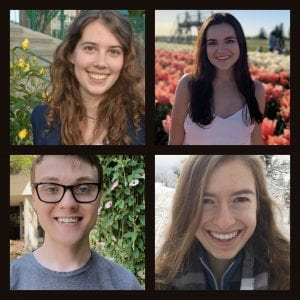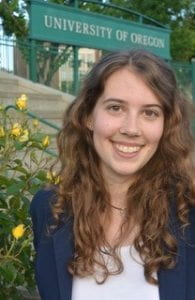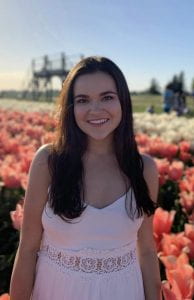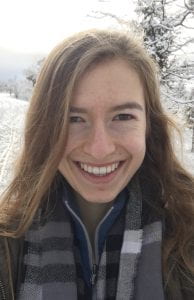 The Chemistry and Biochemistry department is pleased to introduce the recipients of our 2019 undergraduate scholarships!
The Chemistry and Biochemistry department is pleased to introduce the recipients of our 2019 undergraduate scholarships!
Makenna Pennel, Rachel Lutz, Jake Olsen and Madi Scott are all in their senior year in the Clark Honors College.
The Faith Van Nice Scholarship is dedicated to the legacy of alumna Faith Van Nice, and recognizes exceptional UO undergraduate students majoring in Chemistry or Biochemistry. Makenna says she feels incredibly grateful and humbled to have been selected for an award that honors such an inspirational alumna.

Faith Van Nice Scholarship Recipient
Chemistry major Makenna Pennel grew up in Triangle Lake, Oregon, and says it was a high school internship at OSU that sparked her interest in nanotechnology and green chemistry. These interests, combined with a Stamps scholarship, brought her to the UO.
About her research: Makenna has been involved in undergraduate research since her freshman year, an opportunity which began when she met Jim Hutchison during a Run with a Researcher event. Makenna’s research in the Hutchison lab revolves around metal oxide nanocrystals—materials that have a wide array of applications, ranging from thin films in electronics to UV-protection in sunscreens. Her research specifically examines nanocrystal synthesis and the mechanisms behind their formation. This past summer she completed an internship at Northwestern University’s International Institute of Nanotechnology outside of Chicago, working with quantum dots— a class of semiconductor nanoparticles—in the field of quantum information science.
What’s next? Future plans include grad school for chemistry or materials science, but her career plans are wide-open. Makenna says academia and industry are both possibilities. She has also enjoyed presenting science to the public as a volunteer at the Eugene Science Center so science communication, and interdisciplinary opportunities that blend science with other fields such as literature, are very appealing.
The Kuntz-Swinehart Memorial Scholarship recognizes academic excellence in our majors, and was established by former UO Chemistry students in honor of two professors whose instruction, influence and inspiration had a significant impact on their career paths. Rachel says that she is grateful to be recognized in memory of these two influential professors, and thankful to the donors for their support of the scholarship.

Rachel Lutz, a Biochemistry major, is from Portland, Oregon. She had the opportunity early on to become involved in research at OHSU through the Partnership for Scientific Inquiry (PSI), a mentorship program that pairs high school students with research scientists in the Portland metro area. It was her work under her mentor MD-PhDs, and a family friend’s experience participating in a clinical trial to fight her cancer, that inspired Rachel’s passion for medical-related research. The ability to continue to do research as an undergrad factored highly into her choice to attend the UO.
About her research: At the encouragement of her Organic Chemistry instructor, Rachel applied to the PURS undergraduate research program and joined the Pluth lab in her sophomore year. Her research involves synthesizing hydrogen sulfide (H2S) donors to analyze how their structure relates to their activity. H2S is a gasotransmitter – a gaseous molecule that sends signals to cells – which triggers cellular events. Through her work, Rachel seeks to increase our understanding of these molecular processes, which has implications for improving treatments for diseases like diabetes and Alzheimers.
What’s next? Rachel plans to pursue a career in medicine as a doctor and possibly a researcher. She’s passionate about women’s health and empowering people to make informed and healthy choices to improve their quality of life.
The P-Chem Undergraduate Fellowship provides funding for students to conduct research during the summer in a physical chemistry lab at the University of Oregon, under the mentorship of a physical chemistry faculty member. This year, the fellowship was awarded to two majors.

P-Chem Summer Research
Fellowship Recipient
Jake Olsen is a double major in Chemistry and Math from Portland, Oregon. Jake says he chose the UO for its wide-range of science offerings and the chance to do research as an undergrad.
About his research: Jake says he finds research work inspiring because it offers opportunities to make a positive impact while doing something that you love. His interest in physical and theoretical chemistry led him to the Guenza lab, which he joined in the spring of his sophomore year. The lab uses computer simulations and analytical theory to investigate the dynamic and structural properties of polymer systems. Jake’s research builds upon the lab’s coarse-graining model by using a procedure known as backmapping – a timesaving method for reconstructing atomistic information from coarse-grained data. The resulting polymer models have applications in fields such as material design, speeding up the experimental process by identifying specific properties and predicting the behavior of polymer systems prior to synthesizing them in the lab. He sees his research work as creating a resource that allows chemists to more efficiently and economically design materials.
What’s next? Jake is applying to graduate school and is looking forward to continuing to work in a research environment.

P-Chem Summer Research
Fellowship Recipient
Chemistry and Physics major Madi Scott grew up in Medford, Oregon, with a strong interest in math, science and medicine. The Honors College and the opportunity to combine a liberal arts education with research drew her to the UO.
About her research: Madi entered the UO thinking that she wanted to be a cardiologist, but her fall term General Chemistry course introduced her to what she describes as the ‘beauty of the mathematics’ involved in electron transfer, inspiring her to dig deeper by joining the Wong lab the following term. The lab uses laser spectroscopy to look at how light interacts with matter – specifically how molecules come together to form larger structures, and how they conduct electricity. Madi’s work involves building microscopes using lenses, irises, shutters and cameras to take molecular-level images of the semiconductor materials that they create in the lab. Measurements are then taken with a laser and used to analyze the molecular structures in the images. Madi’s goal is to make her measurement techniques more robust so that they can learn more about the behaviors of the molecular structures. Her research has applications for solar cells, LEDs and other materials.
What’s next? Madi plans to go to graduate school for physical chemistry, and then pursue a research career in academia, industry or a national lab.
By Leah O’Brien

